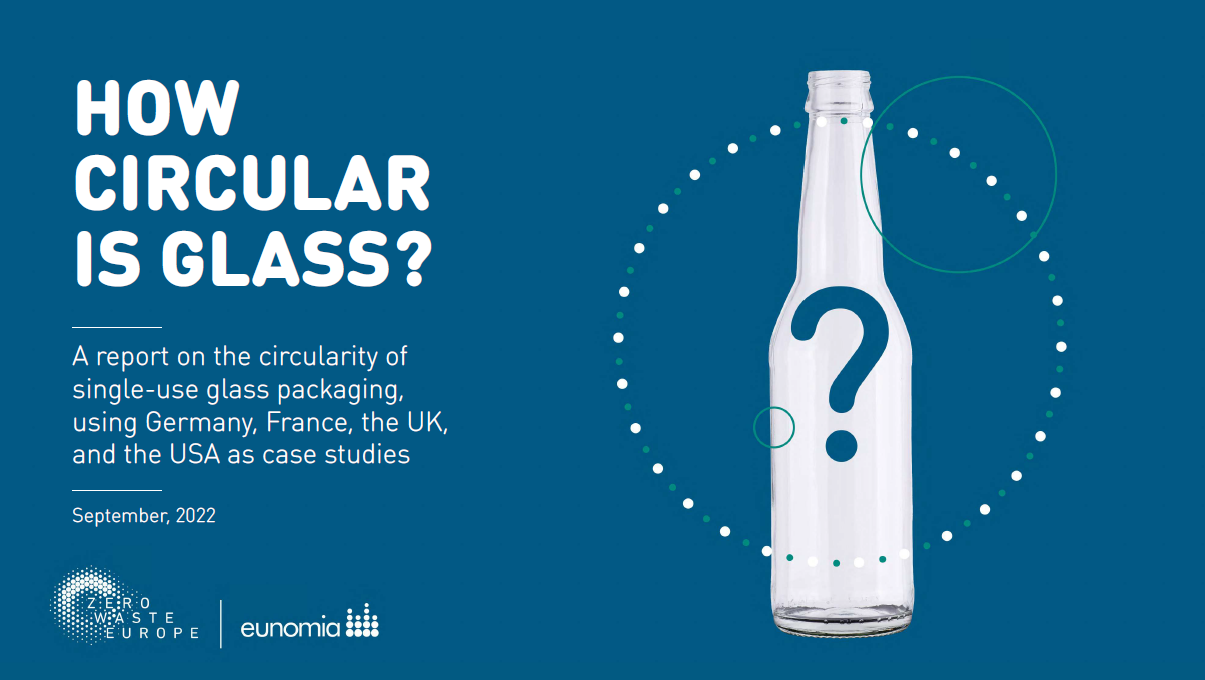New ZWE report exposes main barriers to single-use glass circularity ahead of P&PWD revision

Brussels, 1 September 2022
A new report by Zero Waste Europe (ZWE) identifies the main obstacles to the circularity of single-use glass. Key barriers presented in the “How Circular is Glass? A report on the circularity of single-use glass packaging” study include ineffective collection methods, design, and logistical shortcomings, leading to material and energy losses.
Commissioned to Eunomia Research & Consulting by ZWE, the report is based on four case studies (France, Germany, United Kingdom, and the United States), and uses 2019 data to calculate collection rate, overall recycling rate, closed-loop recycling rate, and recycled content as its four key performance indicators.
The report found that:
- The biggest losses of glass material occur at the collection stage – a huge resource and environmental loss. Up to 30% of lost glass material was reported in the French case study.
- Deposit Return Systems (DRS) with single-use glass in their scope can improve the overall glass collection rates for this material if implemented across Europe, with existing DRS systems currently achieving up to 98% collection rates for glass beverage bottles.
- Collection methods affect the potential for recycling: countries which mainly use a separate collection stream for glass have higher rates of cullet used in the production of new container glass.
- Net glass packaging exporters (e.g. Germany, France) have considerable differences between their closed-loop recycling rates and their recycled content rates, because exported glass packaging escapes the local collection system and it is uneconomic to ship cullet for long distances.
ZWE has urged the European Commission (EC) to make use of the reports’ findings in their upcoming revision of the Packaging and Packaging Waste Directive (P&PWD).
“The P&PWD revision should act on the findings of this report by not only improving the circularity of single-use glass, but also by scaling up more refillable glass packaging systems across Europe and thus helping to tackle the current energy crisis”, says Larissa Copello, Consumption and Production Campaigner at Zero Waste Europe. “This can be done, for instance, by including effective closed-loop recycling via deposit return schemes (DRS) which include single-use glass; and by increasing the market shares of refillable glass packaging via strong reuse targets. We cannot ignore the truth about the single-use of glass anymore: its massive energy consumption during primary production puts single-use glass at the top of materials with the greatest environmental impacts. Yet, these are not justified, since this material is perfectly suited for reuse and recycling.”
In addition to the non-profit’s policy recommendations for packaging in the revised P&PWD, and taking the report’s findings into account, ZWE asks the EC to:
- Mandate the implementation of DRS that include single-use glass packaging, charges reasonable deposit fees, and offer a well-designed infrastructure;
- Improve logistics by encouraging bottling in beverage importing countries so that glass container bottles are recycled and reused/refilled in the same geographical area;
- Mandate the implementation of reuse targets through the introduction of efficient refillable systems with optimised infrastructure and reverse logistics, a suitable incentive to return, a high number of refill cycles, and operated under well-managed pool systems.
ENDS
Notes to Editors:
On collection methods:
The study found that, while Germany has already reached the P&PWD’s recycling target, it set its own target of 90% for material sent for recycling, showing that if the right system is in place, recycling targets can be much more ambitious than currently shown.
On energy efficiency:
One study cited in the report showed a 40% reduction in GHG emissions for glass bottles analysed after the second cycle.
Press Contacts:
Larissa Copello, Consumption and Production Campaigner at Zero Waste Europe, [email protected]
Berta Corredor, Press Officer at Zero Waste Europe, [email protected], [email protected] +32 471965593